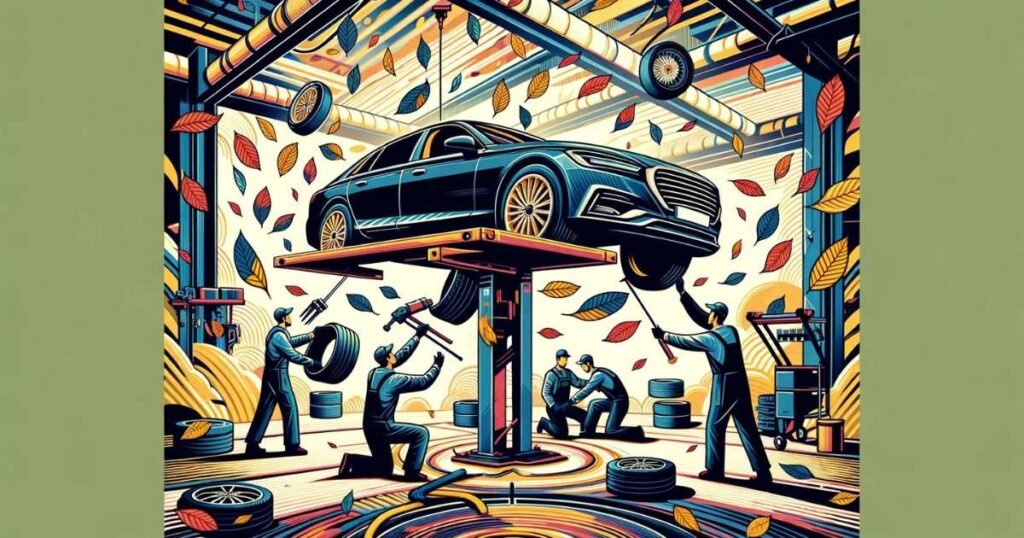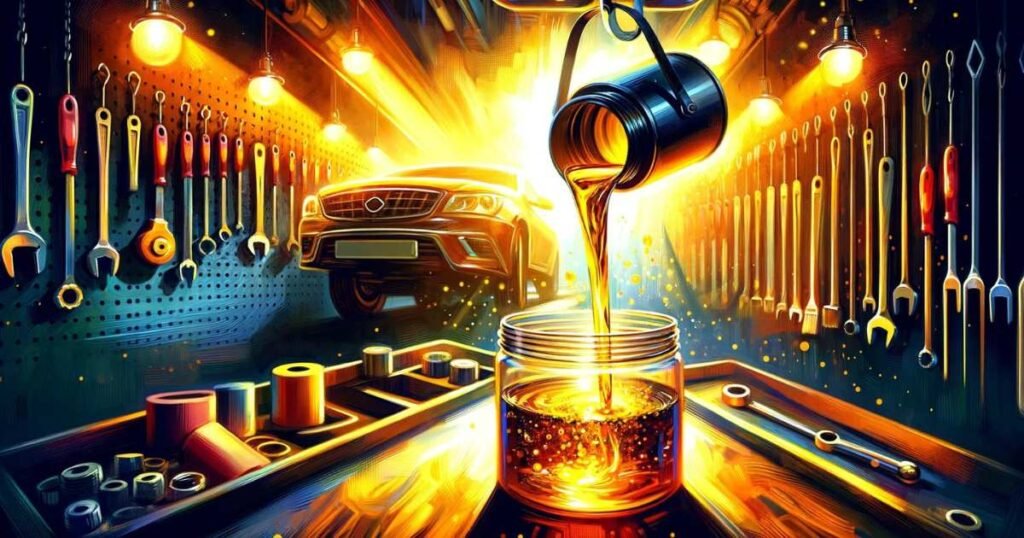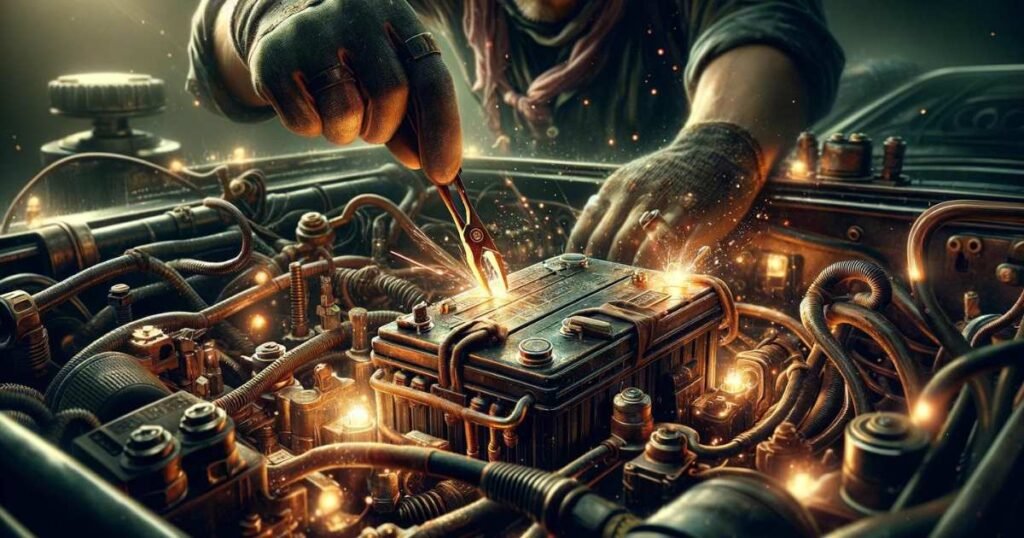Taking care of your car helps keep it looking nice and shiny. It also makes sure it’s safe to drive, works well, and doesn’t use too much gas.
This article will help you learn how to look after your vehicle. We’ll discuss the basic checks you should do, some extra services that could be useful, how much they might cost, and how to schedule appointments to get your car checked.
In this article:
What Maintenance Does a Car Need?
1. Oil Changes & Filter Replacements: Engine oil lubricates moving parts, preventing wear and tear. Regularly changing your oil and filter (as recommended in your manual) is vital for engine health.
2. Tire Care: Proper tire inflation and regular rotations are essential for safety and optimal performance. Check your tire pressure monthly and have them rotated according to your owner’s manual. Additionally, visually inspect tires for tread wear and damage.
3. Fluid Checks & Top-Ups: Various fluids, like coolant, brake fluid, and windshield washer fluid, play crucial roles in your car’s operation. Regularly check fluid levels and top them off as needed, using the recommended types specified in your manual.
4. Filter Replacements: Air filters clean the air entering your engine, while cabin air filters purify the air you breathe inside the car. Replacing these filters regularly ensures optimal engine performance and a cleaner, healthier cabin environment.
5. Brake Inspections & Service: Brakes are vital for safety. Have your brakes inspected regularly by a qualified mechanic, and replace worn-out pads or rotors as needed.
6. Battery Maintenance: A healthy battery is essential for starting your car. Keep your battery terminals clean and corrosion-free, and consider having them tested periodically, especially as they age.
7. Wiper Blade Replacements: Worn-out wiper blades can compromise visibility in bad weather. Replace them when they streak or leave water on your windshield.
8. Light Checks: Ensure all your headlights, taillights, brake lights, and turn signals function properly. Replace burned-out bulbs promptly.
9. Seasonal Maintenance: Adapt your maintenance routine to seasonal changes. For example, winterize your car with antifreeze and consider switching to winter tires in snowy climates.

What are the types of car maintenance?
1. Routine Maintenance
Routine maintenance is important for keeping your car running smoothly. Your car’s owner’s manual will tell you when to do these services. Here’s what they include:
First, there’s an oil change. This helps lubricate the engine to prevent wear and tear. It usually costs between $30 to $80 and takes about 30 to 60 minutes.
Next is tire rotation. This helps your tires wear evenly and last longer. It costs about $20 to $40 and takes 30 to 45 minutes.
Then, there are fluid checks. Mechanics check and top off different fluids like engine coolant, brake fluid, power steering fluid, and windshield washer fluid. This is usually done during an oil change.
Another part of routine maintenance is replacing filters like the air, cabin air, and fuel filters. This keeps your car running well. The cost varies and can be done during an oil change, too.
Battery inspection is also important, especially for older cars. This checks the health of your battery and looks for corrosion. You can often get this done for free at auto parts stores.
Lastly, wiper blade replacement is something you might need. If your wiper blades are worn out, replacing them for clear visibility is a good idea.
This costs about $10 to $30 per pair and is an easy task you can do yourself.

2. Scheduled Maintenance
Scheduled maintenance is needed less often but is still very important. Check your manual to know when to do these:
Spark plug replacement helps with ignition and fuel efficiency. It costs $50 to $200, depending on your car.
Transmission fluid service keeps your transmission working smoothly. It costs $100 to $200 and takes 1 to 2 hours.
A coolant flush and refill help prevent overheating and corrosion. This service costs $50 to $150 and takes 1 to 2 hours.
3. Additional Services
There are also additional services that aren’t required but can help your car:
Wheel alignment ensures your tires are lined up right, which helps with handling and tire life. It costs $60 to $100 and takes 1 to 2 hours.
Brake pad replacement is crucial for safe stopping. The cost varies, ranging from $100 to $500.
Lastly, detailing is a deep cleaning for the inside and outside of your car. The cost depends on the size of your car and the level of detail, and it usually takes several hours.
Remember, taking care of your car with these services can help it last longer and run better!
What Are the Key Factors Affecting Car Maintenance Costs?
The cost of keeping your car in good shape can change based on a few things.
If you have a luxury car or one made for high performance, you’ll usually need to spend more money to maintain it. These kinds of cars often need special care or parts.
Where you choose to get your car serviced can also make a difference in cost. Taking your car to a dealership for repairs might cost more than going to an independent shop.
However, dealerships may have more specialized knowledge about your specific car model.
The kind of parts used for repairs is another important factor. Parts made by the Original Equipment Manufacturer, or OEM parts, tend to be more expensive. They are usually of higher quality and made specifically for your car model.
Aftermarket parts, which different companies make, can be less expensive but might not always match the quality of OEM parts.
Finally, where you live can affect how much you pay for car maintenance. Labor costs and fees for the work done by mechanics can vary from region to region.
So, maintaining your car can be either more or less expensive, depending on your location.
What Should be on Your Essential Car Maintenance Checklist?
Taking care of your car is important, and to make it easier, we can split the tasks into short-term and long-term check-ups. Looking at your car’s owner’s manual is always a good idea.
This manual has special tips and times for checking different parts of your car depending on its type and model.
Short-Term Check-Ups (Do every month or every few thousand miles)
- Oil and Coolant Levels: It’s important to check your car’s oil and coolant levels. Make sure the engine is fantastic when you do this. Your owner’s manual will tell you where to find them and how much should be there.
- Air Filter: A clean air filter helps your engine work better and use less gas. Your manual will tell you when it’s time to change it.
- Tire Pressure and Tread Depth: Checking your tires regularly is a must. Make sure they have enough air and the tread isn’t worn out. And remember to check your spare tire too!
- Lights: Check all your lights, like headlights, turn signals, brake lights, and parking lights, to make sure they’re working.
- Oil and Filter Change: Your car might need an oil change every three months or every 3,000 miles. The type of car and oil you use makes a difference, so check your manual or ask a professional.
- Tire Rotation: Rotating your tires helps them wear evenly and last longer.
- Wax Vehicle: Wax your car every six months after washing it. This protects the paint and stops rust.
Long-Term Check-Ups (Check your owner’s manual for when to do these)
- Transmission Fluid: Make sure your transmission fluid is clean and full for smooth driving.
- Spark Plugs: Changing old spark plugs helps your engine run better and saves gas.
- Coolant Change: Change your coolant at certain times to stop your engine from overheating.
- Serpentine Belt: Look at the serpentine belt and replace it if it’s cracked or worn out.
- Brake Pads and Rotors: Always check how thick your brake pads are and how your rotors look to make sure you can stop safely.
- Battery: Test your battery now and then, especially before winter, to ensure it works well.
- Cabin Air Filter: Change the filter in your car to keep the air inside clean.

How Can I Keep My Car Running Smoothly?
To keep your car running smoothly and avoid big problems, it’s important to follow a good maintenance schedule. Proactive maintenance can help stop problems before they even start, saving you both money and trouble later on.
Listen to your car. If it starts making weird noises, feels different when you drive, or shows any warning lights, don’t ignore these signs.
Minor issues can become big problems if you don’t address them early. It’s like when you get a small scratch and clean it immediately to prevent an infection—paying attention and acting fast helps.
Perform visual inspections regularly. Just like checking a plant to see if it’s healthy, it’s good to look at your car too. Pop open the hood and take a look around.
Check for leaks, hoses that aren’t properly attached, or anything else that looks out of place. Catching these issues early is a great way to keep your car healthy.
Schedule regular check-ups with a professional mechanic. It’s like visiting the doctor, even when you feel fine.
Your car might seem okay, but having a mechanic check it occasionally is smart. They can do a full inspection and find problems you might need help seeing or hearing.
It’s like getting a check-up at the doctor’s office to ensure everything is okay. It’s better to find and fix any minor issues before they become big ones.
Following these tips lets you keep your car in great shape and avoid surprises. Regularly caring for your car is the key to a smooth and safe ride!
Do I need an appointment to get my car maintenance?
Most shops offer online or phone appointment booking. Some provide same-day service for basic maintenance, while others require scheduling in advance.
What are the Benefits of Routine Maintenance?
Taking care of your car regularly is very important. Spending a little time and effort to keep your car in good shape helps a lot in the future. Here’s how regular car maintenance makes a big difference:
- Boosts Fuel Efficiency: When you take good care of your car, like changing its oil and replacing the air filter, the engine works better. This means your car can go farther using less gas, which saves you money!
- Enhances Safety: Make sure your tires are filled with the proper air, your brakes work well, and your headlights are clear. These things help you to drive safely and avoid accidents.
- Prevents Costly Repairs: If you fix small problems with your car early, they won’t become significant, expensive issues later. It’s like taking care of a small scratch so it doesn’t become a big cut.
- Extends Your Car’s Lifespan: Just like eating healthy and exercising keeps you strong for a long time, taking care of your car regularly helps it last longer.
- Increases Resale Value: If you ever want to sell your car, keeping it well-maintained is a good idea. Cars taken care of and with service records tend to be sold for more money.
How Can I Maintain My Car Myself?
Caring for your car can involve deciding between doing it yourself (DIY) or going to a dealership.
While professionals are better suited for maintenance tasks, several DIY options can help you save time and money. Let’s explore some of these tasks.
Topping off fluids is a simple task you can manage on your own. Your car needs various fluids to run properly, and keeping them at the correct levels is important.
Just refer to your car’s manual to know what types of fluids your car requires and the correct amounts.
Replacing wiper blades is another task you can easily do. Old or worn-out wiper blades can make it hard to see in bad weather, so changing them is quick and essential for safe driving.
Changing air filters is a straightforward DIY task, too. It helps improve your car’s engine performance and air quality inside your vehicle.
However, it’s wise to consult a qualified mechanic if you ever feel uncertain about a task. Mechanics have the expertise and tools for more complex repairs and can ensure your car’s safety and longevity.
Final Thoughts
Keeping your car in top shape is key to ensuring it runs smoothly, safely, and reliably for years. A bit of preventive maintenance can save you time, money, and stress on the road. Remember, taking care of your car is important!
FAQs
What maintenance does a car need?
Every car needs maintenance to stay safe and run well. Routine tasks include oil changes, tire rotations, and fluid checks. Scheduled tasks, done at specific intervals, include spark plug replacements and coolant refills. Optional services like wheel alignments and brake pad replacements can improve performance and appearance.
What is routine maintenance on a car?
Routine maintenance keeps your car healthy. Regularly change the oil, rotate tires, check fluids, and replace filters as needed. Inspect the battery, especially in older cars, and replace wiper blades yearly for clear visibility. Follow your manual for specific intervals.
How do you properly maintain a car?
Proper car maintenance involves following your owner’s manual, keeping a log of services, scheduling appointments ahead, choosing reputable shops, asking your mechanic questions, and considering discounted maintenance plans.
What maintenance does a car need at 100,000 miles?
At 100,000 miles, your car needs extra care. Replace spark plugs, service transmission fluid, flush coolant, and check differential fluid. Clean the fuel system for better performance and inspect the brake system and suspension. Follow your manual for specific intervals.
![03ea5ac8-ead1-32a0-aedc-9b2f37828767 What Maintenance Does a Car Need [Full Guide]](https://autoroadpro.com/wp-content/uploads/2024/02/What-Maintenance-Does-a-Car-Need-Full-Guide.jpg)